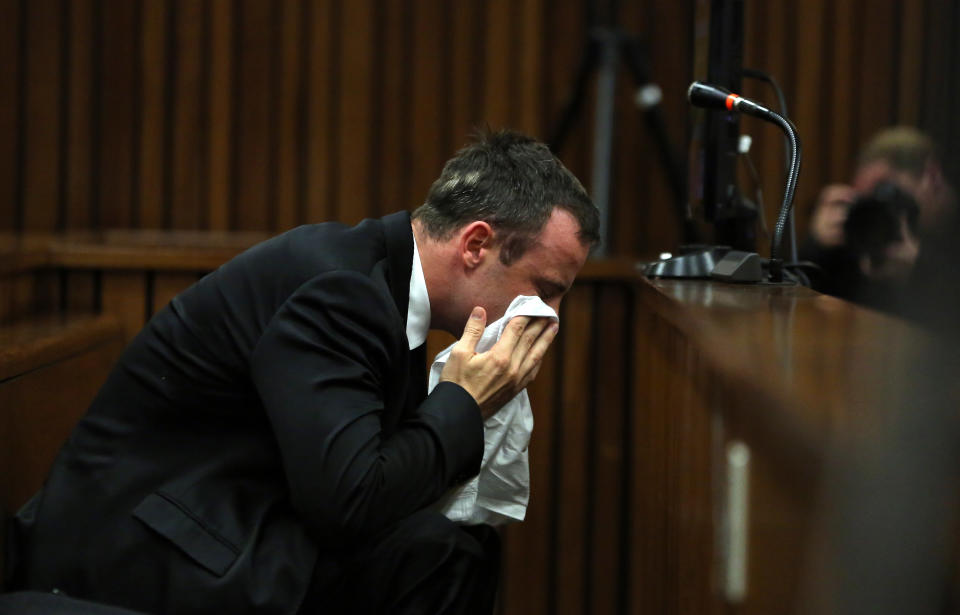Pistorius defense gives different account of death
PRETORIA, South Africa (AP) — Oscar Pistorius' defense team opened its case Monday by trying to poke holes in the prosecution's premeditated murder charge against the double-amputee Olympian. Pistorius is expected to testify to explain why he shot dead his girlfriend Reeva Steenkamp in the early hours of Valentine's Day last year.
A pathologist called as the first defense witness testified that if the athlete fired his 9 mm pistol in two quick bursts, as Pistorius claims he did, his girlfriend probably didn't have time to scream.
Prof. Jan Botha's testimony is important for Pistorius' defense because it combats prosecutors' claims that Steenkamp screamed during the gunshots that killed her and that the athlete therefore must have known he was firing at her.
Botha said he believed that before Steenkamp was able to react to the first shot through a toilet door that hit her in the hip, "the remaining bullets would have struck her."
"If the shots were fired in rapid sequence, and these four shots could have easily been fired in four seconds, I think it's highly unlikely that she would have called out," Botha testified.
Pistorius' lawyers say he shot in two quick double-tap bursts.
Charged with premeditated murder in Steenkamp's shooting death, Pistorius pleaded not guilty and says he shot his girlfriend by mistake through the toilet cubicle door thinking she was a dangerous intruder hiding in his bathroom.
Witnesses say they heard a woman screaming before and during the gunshots that killed Steenkamp, bolstering the prosecution's claim that the runner and his lover fought in the pre-dawn hours before he killed her, which Pistorius denies. He says he was the only one to scream on the night.
Pathologist Jan Botha's testimony contradicted parts of the evidence given by state pathologist Gert Saayman and police ballistics expert Christiaan Mangena, and came under fiery cross-examination by chief prosecutor Gerrie Nel, the first time Nel has cross-examined a witness in the trial.
During some of the pathologist's testimony, Pistorius sat hunched over with his hands over his head in the courtroom as details of Steenkamp's injuries were again aired. At times, his body shook.
Botha's testimony followed four weeks of prosecution-led testimony and a week's adjournment after one of the judge's aides fell ill. He was allowed to take the stand first and ahead of Pistorius in an agreement with prosecutors because of a family illness.
Defendants who choose to testify normally go first in South Africa and Pistorius is expected to testify straight after Botha and explain his version that he killed Steenkamp by mistake, fearing his life was under threat.
Opening the defense's case, Pistorius lawyer Barry Roux said the defense would argue that standing only on his stumps, Pistorius' "disability" and "vulnerability" were factors in the accidental shooting. Roux said he would call between 14 and 17 witnesses.
The defense also attempted to cast doubt on the prosecution's assertion that Steenkamp ate no more than two hours before the double-amputee runner killed her.
Pistorius has claimed the couple was in his bedroom by 10 p.m. on the night of the shooting and any indication that they were awake much later could undermine the Olympian's account of the sequence of events. Pistorius fatally shot Steenkamp after 3 a.m. the next morning.
Pathologist Botha said the time frame of digestion was difficult to assess because of variations in many factors, including the volume of food consumed, its caloric content and the psychology of the person who was eating. The testimony countered statements by the state pathologist who said that, judging by the food contents in her stomach, Steenkamp probably last ate no more than two hours before her death.
___
Gerald Imray is on Twitter at www.twitter.com/GeraldImrayAP





